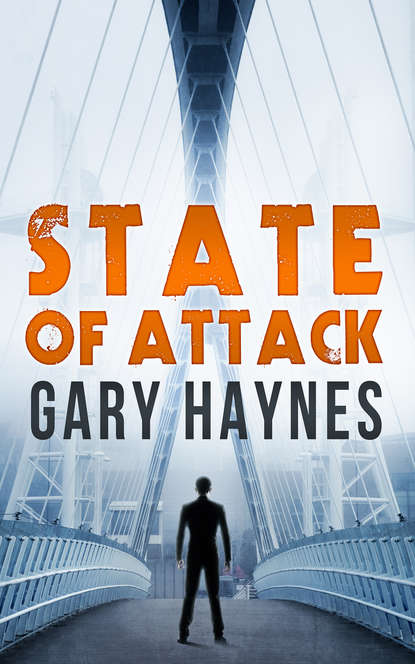По всем вопросам обращайтесь на: info@litportal.ru
(©) 2003-2024.
✖
State Of Attack
Автор
Год написания книги
2019
Настройки чтения
Размер шрифта
Высота строк
Поля
Basilios was temporarily stunned. He didn’t know if it was a cruel attempt to extend his torment. Perhaps I will be cut down as I stand up or shot in the back as I head for the drainage ditch? he thought. But he knew he didn’t have a choice. As the congealed blood-soaked blade was lifted from his shoulder, he raised himself up in as dignified a fashion as possible, given his wounded leg and escalating uncertainty. He turned without looking at the leader and hobbled towards the ditch.
But he didn’t suffer any further humiliation. In fact, the men seemed to show him a grudging respect, nodding slightly and waving their hands in gestures of encouragement. He had survived.
Chapter 6 (#ulink_74c62077-ae97-52d4-8d44-5c0a549aec3c)
When Basilios was some twenty yards away, the man who’d called himself Ibrahim handed the sword to a subordinate, who had stepped over to him for that purpose.
“Take it home for me, brother,” Ibrahim said, but hesitated.
He always hesitated at this point. To him, the weapon, steeped as it was in centuries of sacred warfare, possessed its own consciousness, and sometimes he thought it seemed to pulsate with the burden of it.
“Take good care of it.”
The man nodded.
Ibrahim’s potentially hazardous journey back to the Palestinian territories would not allow him the luxury of carrying his sword, but his select men would go via the tunnels in north-west Egypt, masquerading en route as opportunistic antique dealers before being smuggled into the Gaza Strip.
The other men took out their cellphones and started to take further videos and photos of the decimated town, which they would post on their burgeoning social media sites. The rationale was principally twofold: to recruit foreign jihadists and create fear in their enemies. It had been an effective digital strategy here, and particularly so in neighbouring Iraq.
Ibrahim had his eyes closed now and began reciting verses from the Qur’an, quietly, holding his hands crossed at his chest. Ibrahim’s Shia enemies prayed with their hands dangling by their sides, like apes, his imam had told him years ago. But the Christians didn’t even recognize the Prophet, peace be upon him. Killing them had been God’s will, he believed.
As for the release of the sole survivor of their attack on the town, that wretch would simply ensure that his own reputation as a ruthless commander would spread, adding to his already growing kudos. If these things hadn’t been a factor, he would have killed the Christian when he’d been forced to kneel before him.
He felt whole here, able to play out the purist doctrines of his religion, as he saw it. But the old one, the Amir, had called for him. People had told him it would be so, and then his real mission would begin in earnest. A great mission, Ibrahim thought, the Silent Jihad. And after the brief detour he’d decided to make to Ankara, Turkey, he would devote what little time he’d consented to have left on this earth to it.
The dry wind picked up, bringing with it the stinging sand grains, which clogged up engines and weapons, and swelled the eyes. He wrapped the ends of his black headdress over his mouth and nose. The aroma of lime grooves and climbing jasmine shrubs had left this place. They may never return, he thought. There was nothing but the dank odour of his unwashed sweat and the familiar scent of death.
“A plague is coming,” he whispered in Arabic, “a plague to wipe out a plague.”
Chapter 7 (#ulink_629ef503-42ff-5f58-8731-bef211ee7ff4)
Six Days Later
A heat haze rose above Ankara’s melting tarmac, the capital of Turkey experiencing its hottest summer in twenty years. Western tourists strolling around the historical centre of the city, situated upon a rock-strewn hill, stayed in the shade, their reddened skin pressed close to the battlements of the ancient citadel. If a breeze could have been bought with hard cash, there would’ve been a lot of takers. Even the fine-boned Angora cats hid in alleys under concrete overhangs, their feral nature drained by the fierce midday sun.
A little under a mile away in an inconspicuous office building with a bare concrete facade, the general, Tom’s father, was sitting on a padded chair in front of a chipped mahogany desk. He was wearing dark blue slacks and a white, open-necked shirt. His hair was turning from sandy to grey, but his waistline remained lean due to a mixture of jogging and a healthy diet. Although the room had functioning AC, beads of sweat formed on his furrowed forehead and rolled down his back. He thought it was just bad luck that it was so damned hot.
The Turk behind the desk was called Hassam Habib. He appeared to be too young to be taken seriously in intelligence circles. Mid-thirties at most, the general thought, his crow-black hair and eyebrows so immaculate that he looked as if he’d just had a makeover. He was a handsome man, with prominent cheekbones, a thin high-ridged nose and eyes as unblemished as shellfish flesh. He was an analyst in MIT, the Turkish National Intelligence Organization. And he was looking as if he’d found himself in the wrong job.
The general knew the Turks had their problems, as every independent state did. The country was desperate to join the EU, for economic reasons, but they just couldn’t get to grips with the necessity for human rights and political expediency. And just as the threat of terrorism from the PKK, the Kurdistan Workers’ Party, was abating, they had to deal with the fallout from the Sunni-Shia conflict.
It was no longer confined to the Middle East and was taking hold in Turkey, too, fuelled by disgruntled Shia refugees from Syria, people who didn’t take too kindly to the Sunni Turkish president’s call for the downfall of the Assad regime. Then there were the Alevi, followers of a Muslim sect that made up twenty-five per cent of Turkey’s population. As a result of increasing sectarian violence against them, they were rioting on the streets and calling for independence. Habib had a right to look a little stressed, the general thought.
After they’d finished some small talk, the wooden office door creaked opened and a rotund middle-aged woman in a stained white dress, that seemed two sizes too small, walked in carrying a tray inlaid with brass. She didn’t speak, but served coffee and a glass of water to each of them before leaving, placing the general’s cup on a lace doily that was already positioned on a small half-moon table tucked into the side of the chair. On the other side of the chair the general had placed his brown leather briefcase.
“Do you like our coffee, general?” Habib asked after finishing two short slurps.
“I like it just fine,” the general said, although like most things in Turkey he found it too harsh.
“Not too bitter for you?”
“I said I like it just fine.”
Habib’s mouth became a closed-mouthed smile. “Now, general,” he said. “How may I be of assistance to you?”
“There’s a man we are particularly interested in,” the general replied, picking up the cup off the doily. “He’s come up on our radar. He’s known only as Ibrahim. The Sunni jihadists call him the Sword of Allah. You heard of him?”
Habib pouted his generous lips before rubbing his angular face.
“I said, you heard of this Ibrahim?”
The general had found Habib’s actions too contrived. The guy wasn’t looking to buy time. He was looking to sell intel.
“It’s a common Muslim name, is it not?” Habib replied, taking a sip of water. “But a modern-day Khālid ibn al-Walīd, I think not,” he went on, referring to the original so-called Sword of Allah, a companion of the Prophet and his greatest military tactician.
“Look, we can dance around this all afternoon, if you like, but why don’t we just cut the bullshit and get right to it? Whatcha say, huh?”
“You Americans. So loud. So aggressive,” Habib said, his tone half serious.
“I apologize if I’ve offended your sensitive side.”
“I can see you don’t want to be, how you say, subtle about this.”
“Subtlety’s a luxury we can’t afford right now.”
“All right, general. No more dancing around, as you put it. I presume I don’t have to spell out the rules?”
“You don’t,” the general said.
He replaced the cup and leaned forwards, legs splayed, fingers interlocked between them, paraphrasing in his own mind what Habib would have said: I will deny all knowledge of what takes place in this office andwhen I have a chance for revenge I will take it.
Habib nodded. “There’s a rumour that he is protected by the Turkish mafia, and by the militant arm of Hamas in the Palestinian territories,” he said, referring to the Sunni terrorist group. “There are also rumours that he has strong links with Al-Shabaab in East Africa.” He puckered his lips. “Rumours, general, are very dangerous things, are they not?”
The general eyed the younger man. That was a helluva statement, he thought. He made sure his face didn’t show any emotion. “What are my chances of finding him?”
Habib snickered. “Zero, my friend,” he said. “You will never find him. He is a shadow, they say, a puff of grey smoke in the great conflagration that is the warring Middle East. But he has eyes and ears all over, by all accounts. Why do you want to find this man? I mean, apart from the fact he is a terrorist?”
Good question, the general thought.
Chapter 8 (#ulink_12a91944-2373-5645-9c81-f70f00e0ddd3)
Tom had driven for nearly an hour. It was dawn, the muted outline of the fading crescent moon flanked by rolling cumulous clouds. His retreat seemed as if it was in the remote countryside, despite being only about a mile from Arlington County. A hundred-year-old, two-storey farmhouse surrounded on three sides by cornfields and elm coppices. Situated on the banks of the Potomac River, which was a natural border between Virginia and DC, its location was just about perfect for him.
He parked his ten-year-old silver Buick Century and got out. He walked over the flint-ridden path to the porch, admiring the apple orchard nearby. It was skirted by a tarmac walkway that led to a narrow road. On either side of the path, a pristine lawn sloped gently all the way down to the tree-lined banks of the river.
He could just about make out a patch of water in the half-mile-wide stretch. He could relax here and forget about the world of the Bureau of Diplomatic Security, at least for as long as he wasn’t contacted via his secure cellphone. He paid a part-time gardener to look after the grounds and keep an eye on his collection of bonsai trees, the man’s wife helping out with cleaning now and then; but apart from them, people rarely visited. He lived alone.
When he couldn’t afford the time to drive up here he stayed in his small redbrick townhouse in Columbia Heights, a couple of blocks from the Metro station, located in the north-west quadrant of DC. It was an ethnically diverse neighbourhood that had been left semi-derelict for decades after the assassination of Martin Luther King, Jr, in 1968. But the last twenty years had seen significant redevelopment, with a burgeoning middle class and an influx of brand names. But he still felt solitary, even there.






